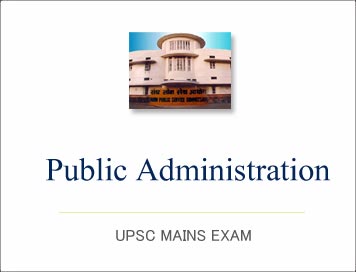
(Exam Paper) UPSC IAS Mains 2001: Public Administration
Paper- I
Section A
1. Answer any three of the following in not more than 200 words each:
(a) “Publicness” of Public Administration in an ideal democratic government
remains the ultimate value in theory and practice.’ Elucidate.
(b) Minmobrook Conference in USA identified four features crucial to ‘new public
administration’. Explain.
(c) ‘The nature and role of communication in administration indicates that
“Communication is authority”.’ Comment.
(d) Critically examine the models of Max Weber and Chester I Barnard with
reference to ‘bureaucratic authority’.
2. The ‘decision-making scheme’ and ‘satisfying model’ of Herbert A
Simon is the major component of administrative theory. Comment.
3. Why do all administrative organizations consider ‘hierarchy’ as the
many splendoured technique ? Discuss.
4. In what respects, the powers of proposed institution of Lok Pal in
the Bill already introduced in Indian Parliament, will strengthen the
institution as compared to Parliamentary Commissioner of UK?
Section B
5. Answer any three of the following in not more than 200 words each:
(a) ‘The inculcation of belief in the real existence of a common purpose is
an essential executive function.’ Comment.
(b) Burekehead says : ‘Budget in Government is a vehicle of fiscal policy and a
tool of management.’ Examine this statement.
(c) Critically comment on Riggsian Prismatic Sala model of administration of
developing societies. To what extent Indian Administrative system exhibits
prismatic characteristics ?
(d) ‘Statutory External auditing is one of the protectors of democracy in the
parliamentary form of Government.’ Comment.
6. A fairly adequate analysis of the Administrative Organization in
Government is possible when we treat ‘bureaucracy’ as a ‘structure’ and
‘administration’ as a ‘function’. Discuss.
7. What techniques the Government of India have employed to evaluate
(appraise) the performance of senior level employees, i.e., Class I and Class
II? Are you satisfied with these techniques?
8. Critically examine the monetary and fiscal policies of Government
of India in the decade 1991 to 2001. Do you think world financial institutions
had a role to play in opening Indian economy to global forces? Give reasons to
substantiate your argument.
Paper- II



